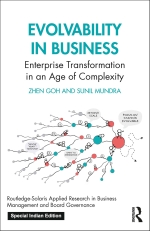Tab Article
Through the unique combination of evolutionary biology and management theory applied to business cases, and keeping in mind that organisations are fundamentally human systems, Goh and Mundra propose organisational evolvability as a new frame to guide enterprise transformation and change.
Some of the topics covered in the book include: Understanding the differences between Complicated and Complex; Moving from Planned Change to Emergent Change; Applying principles of evolution to enterprise evolvability, and how to operationalise it using a Sense-Adapt-respond loop; Identifying and addressing Sensemaking gaps; including different approaches to scaling and repaying organisational debt; Measuring outcomes under conditions of complexity. This book proposes that transformation is not a one-and- done event but a continuous process of adapting to a dynamic and unpredictable environment. The goal of transformation should be to enhance organisational evolvability – the capacity of a system for adaptive evolution. This book encourages leaders and practitioners to view organisations as open and complex adaptive systems and provides frameworks that help them to manage transformations with adaptive grace.
A perfect volume for managers, executives and leaders at companies of all sizes. It will also be of interest to instructors in executive education, as well as scholars in organisational studies and business management. This book is for anyone seeking to create a culture of adaptability and change.


